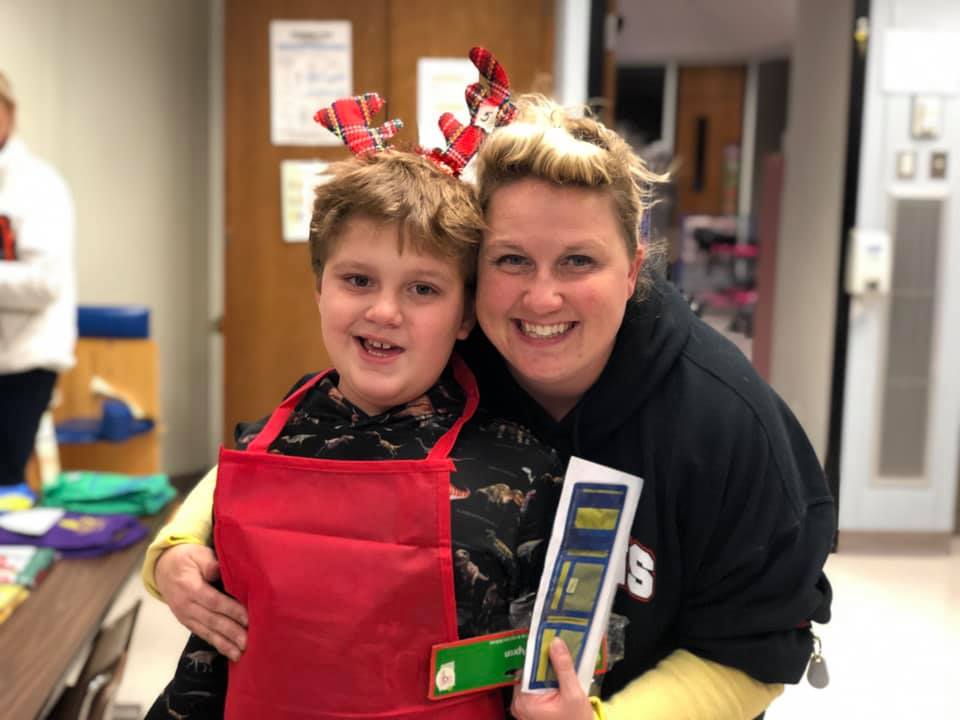3 Minutes of Play a Day
by Kerri Silverthorn | Thu, Jan 30th, 2020

“Oh no! A zombie is coming, and I might get attacked.”
A pretend zombie has entered our home and put the entire family in danger.
“Hurry, and get your blaster. Laser that zombie!”
G. runs and blasts the zombie, and mommy is safe and sound… Whew!
Sound like a familiar fun and energetic pretend game? G. and I play this one quite a bit. I think the best of times that I have as a parent are when my children are fully immersed in play with me. My kids crave this type of interaction, but sometimes I’m just too tired, exhausted, or overwhelmed to get down on the floor and roll around. Some days I have the energy and other days I just don’t, and that is why I love the Joyful Together guide by Ohio Guidestone and the PLAY Project (PLAY).
Not only is playing fun but children learn through play also. Both Joyful Together and PLAY are evidence based interventions used by TuscBDD therapists in the schools, homes, and daycare centers. Joyful Together is designed with all kids in mind and encourages families to find short 3 minute bursts to connect through play each day. Dr. Ben Kearney, the Ohio Guidestone Chief Clinical Officer, used the latest research in neurobiology and interpersonal psychology evidence as well as his experiences as a professional and parent to create Joyful Together (“Getting Joyful,” 2018). PLAY is geared toward children with suspected autism or delays in social communication and is an evidence-based, intensive, autism early intervention.
Engaging in play leads to improved relationships between parents and their children; it can strengthen an already strong bond, be a part of the trauma healing process, and improve social skills for children with delays. As a result, the child improves in their social and functional development (“Autism Treatment,” 2019). Doing simple activities together helps the brain in a positive way that enables people to reduce stress and build relationships, which ensures trust and the ability to learn new behaviors. Try starting out with 3-5 minutes of intentional, simple play each day. When your child engages in play, eye contact, safe hands and feet, or any positive connections, make sure to award them with lots of love and praise.
TuscBDD employs several types of therapists, behaviorists, and interventionists to help families and children learn and grow together through various programs such as: Early Intervention, Starlight Preschool, Starlight School Specialized Service Program, PLAY Project, Joyful Together, PBIS (Positive Behavior Intervention and Support), therapeutic respite, and more. These services are free to Tuscarawas County residents and are locally funded by the TuscBDD levy, which is generously supported by our kind community. Thank you for your continued support for your friends, neighbors, and family members with developmental disabilities.
Ideas for Play
- Hair Dresser: Allow your child to brush & pretend style your hair and visa versa.
- Burrito Blanket: Lay out a large blanket on the floor and wrap your child up like a burrito. You can roll him or tickle him if he likes that too.
- Echo: Use many different voices to echo each other. The adult will say a positive phrase in a voice then the child has to repeat the phrase and voice. Remember to take turns and use a different voice (use a silly voice, a deep voice, a robot voice, a baby voice). Say phrases like: I love you, you are good, and I enjoy playing with you.
- Brain Power: Hold your child’s head with both hands and look into her eyes. Your words and gaze are going to fill her brain up with power, quick wits, confidence, and love! Tell your child that it’s Brain Power time! Tell her you are filling her brain up with extra strength and smarts! You can say that you are adding bravery and love! You can ask her what else she needs in the day.
- Waiting in Line: A great time to get in 3 minutes of play a day is when you are standing in line at a store. Try tickling, singing, rhyming, I spy, or name that tune.
References
Autism Treatment | Autism Intervention Program. (2019). Retrieved from https://www.playproject.org/
Getting Joyful Together. (2018). Retrieved from https://ohioguidestone.org/wp-content/uploads/2018/11/SOH_FALL_WEB.pdf
PLAY Project at Work. (2018). Retrieved from https://ohioguidestone.org/interventions-for-asd-children/Ohioguidestone
Kerri Silverthorn Thu, Jan 30th, 2020